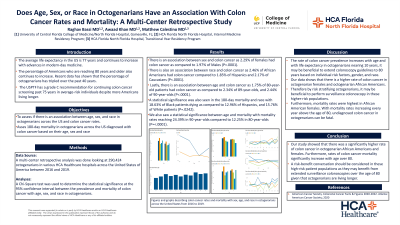Tuesday Poster Session
Category: Colon
P3045 - Does Age, Sex, or Race in Octogenarians Have an Association With Colon Cancer Rates: A Multi-Center Retrospective Analysis
Tuesday, October 24, 2023
10:30 AM - 4:00 PM PT
Location: Exhibit Hall

Has Audio

Raghav Bassi, MD
University of Central Florida
Gainesville, FL
Presenting Author(s)
Raghav Bassi, MD, Awaad Khan, MD, Matthew Calestino, MD
University of Central Florida, Gainesville, FL
Introduction: The average life expectancy in the US is 77 years old and continues to increase with advances in modern day medicine. As a result, the percentage of Americans that are reaching 80 years and older also continues to increase. Recent data has shown that the percentage of octogenarians has tripled over the past 40 years. The USPTF has a grade C recommendation for continuing colon cancer screening past 75 years in average risk individuals despite more Americans living longer.
Methods: A multi-center retrospective analysis was done looking at 290,424 octogenarians across various hospitals in the United States of America between 2016 and 2019. A Chi Square test was used to determine statistical significance between prevalence of colon cancer and age, sex and race in octogenarians.
Results: With a sample size of N=289,627, we can say that there is an association between sex and colon cancer at the 95% (α=.05) confidence limit (P< .0001). 2.29% of females had colon cancer as compared to 1.97% of Males. With a sample size of N=290,424: We can also say that there is an association between race and colon cancer at the 95% (α=.05) confidence limit (P< .0001). 2.46% of African American patients had colon cancer as compared to 1.85% of Hispanics, 1.94% of other race, and 2.17% of caucasian patients. Lastly, with a sample size of N=290,424, we can say that there is an association between age and colon cancer at the 95% (α=.05) confidence limit (P< .0001). 1.75% of 80 year old patients had colon cancer as compared to 1.97% of 81 year olds, 2.33% of 82 year olds, 2.04% of 83 year olds, 2.21% of 84 year olds, 1.98% of 85 year olds, 2.24% of 86 year olds, 2.12% of 87 year olds, 2.58% of 88 year olds, 2.34% of 89 year olds, and 2.44% of those 90+.
Discussion: The rate of colon cancer prevalence increases with age and with recent data showing that life expectancy in octogenarians is near 10 years, we propose that colonoscopy guidelines be extended to 80 years based on individual risk factors, gender and race. Our study above revealed that there is a higher rate of colon cancer in octogenarian females and African Americans. Therefore in these higher risk individuals, the pros of colon cancer screening and treatment may outweigh the cons. Despite the overall risk of colon cancer being higher in males, out study interestingly shows that in patients over the age of 80 years, the risk of colon cancer was actually higher in females.

Disclosures:
Raghav Bassi, MD, Awaad Khan, MD, Matthew Calestino, MD. P3045 - Does Age, Sex, or Race in Octogenarians Have an Association With Colon Cancer Rates: A Multi-Center Retrospective Analysis, ACG 2023 Annual Scientific Meeting Abstracts. Vancouver, BC, Canada: American College of Gastroenterology.
University of Central Florida, Gainesville, FL
Introduction: The average life expectancy in the US is 77 years old and continues to increase with advances in modern day medicine. As a result, the percentage of Americans that are reaching 80 years and older also continues to increase. Recent data has shown that the percentage of octogenarians has tripled over the past 40 years. The USPTF has a grade C recommendation for continuing colon cancer screening past 75 years in average risk individuals despite more Americans living longer.
Methods: A multi-center retrospective analysis was done looking at 290,424 octogenarians across various hospitals in the United States of America between 2016 and 2019. A Chi Square test was used to determine statistical significance between prevalence of colon cancer and age, sex and race in octogenarians.
Results: With a sample size of N=289,627, we can say that there is an association between sex and colon cancer at the 95% (α=.05) confidence limit (P< .0001). 2.29% of females had colon cancer as compared to 1.97% of Males. With a sample size of N=290,424: We can also say that there is an association between race and colon cancer at the 95% (α=.05) confidence limit (P< .0001). 2.46% of African American patients had colon cancer as compared to 1.85% of Hispanics, 1.94% of other race, and 2.17% of caucasian patients. Lastly, with a sample size of N=290,424, we can say that there is an association between age and colon cancer at the 95% (α=.05) confidence limit (P< .0001). 1.75% of 80 year old patients had colon cancer as compared to 1.97% of 81 year olds, 2.33% of 82 year olds, 2.04% of 83 year olds, 2.21% of 84 year olds, 1.98% of 85 year olds, 2.24% of 86 year olds, 2.12% of 87 year olds, 2.58% of 88 year olds, 2.34% of 89 year olds, and 2.44% of those 90+.
Discussion: The rate of colon cancer prevalence increases with age and with recent data showing that life expectancy in octogenarians is near 10 years, we propose that colonoscopy guidelines be extended to 80 years based on individual risk factors, gender and race. Our study above revealed that there is a higher rate of colon cancer in octogenarian females and African Americans. Therefore in these higher risk individuals, the pros of colon cancer screening and treatment may outweigh the cons. Despite the overall risk of colon cancer being higher in males, out study interestingly shows that in patients over the age of 80 years, the risk of colon cancer was actually higher in females.

Figure: Fig 1: Chart breaking down colon cancer rates in octogenarians by race, age, sex and by year between 2016 and 2019.
Disclosures:
Raghav Bassi indicated no relevant financial relationships.
Awaad Khan indicated no relevant financial relationships.
Matthew Calestino indicated no relevant financial relationships.
Raghav Bassi, MD, Awaad Khan, MD, Matthew Calestino, MD. P3045 - Does Age, Sex, or Race in Octogenarians Have an Association With Colon Cancer Rates: A Multi-Center Retrospective Analysis, ACG 2023 Annual Scientific Meeting Abstracts. Vancouver, BC, Canada: American College of Gastroenterology.
